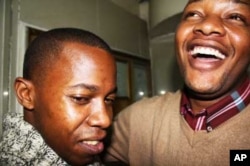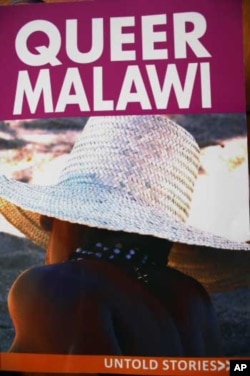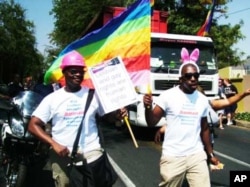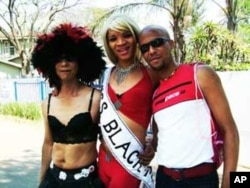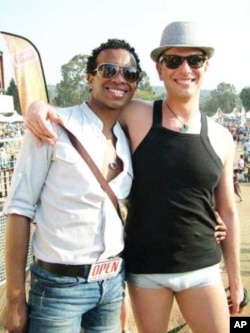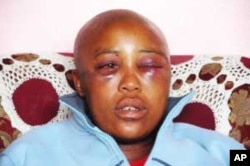Part 1 of a 5 part series: Gays in Africa
1 | 2 | 3 | 4 | 5
International human rights groups are reporting increases in hate crimes against gays and lesbians across Africa. All over the continent, they say, homosexuals are being harassed and ridiculed, assaulted and arrested, tortured, jailed and murdered – and on an unprecedented scale.
“We have seen an upsurge of violence, of discrimination.… You’ve got guys in Cameroon being arrested; you’ve got guys in Nigeria being killed for being gay. It’s happening all over Africa,” says Denis Nzioka, one of East Africa’s most prominent gay rights activists. “We’re under siege,” he adds in his Nairobi office.
The action against African homosexuals, NGOs say, is happening at a time when the continent’s gays and lesbians are asserting themselves like never before, becoming more vocal and more visible in their demands for what they consider to be basic human rights.
“The hatred directed at gay people creates fear. And this creates the ‘fight or flight’ syndrome. Some gay people flee and go underground. Others choose to fight fire with fire. That’s why you see a corresponding upsurge in openly gay activities all over Africa,” explains Nzioka, who works for Africa’s Gay Activists Alliance.
After decades of being underground, some groups in Africa are publishing gay-related material, holding illegal marriages, marching and protesting – daring the authorities to take action against them…risking, and sometimes receiving, the wrath of the continent’s “homophobes.”
“It’s almost as if African gays are saying to the haters, ‘Here we are; we are proud to be gay; catch us if you can.’ It’s a very dangerous situation. It’s a war,” says Nzioka.
In most of Africa’s 53 countries, same sex acts are illegal and punishable with long prison sentences. In some nations, like Mauritania, Somalia and Sudan, gays and lesbians can be put to death if convicted of “sodomy” or “indecent” sexual activities.
Many continental authorities – including political and religious leaders – say homosexuality goes against God and African culture.
‘Homophobic’ acts across Africa
The spotlight was put on same-sex relations in Africa last year when Ugandan MP David Bahati tried to get his Anti-Homosexuality Bill passed into law. The draft legislation calls for the execution of individuals who have gay sex with disabled people or under-18s, and the imposition of fines or imprisonment on anyone found to be “promoting” homosexuality.
Human rights advocates blame a subsequent wave of attacks on homosexuals in Uganda – including the murders of gay activists Paskikali Kashusbe and David Kato – on Bahati’s bill and “religious sponsored homophobia.” Bahati denies the charge.
In South Africa, discrimination against homosexuals is illegal, and it’s the only country in Africa that allows gay marriage. But even here, gangs carry out so-called “corrective” rapes on lesbians and sometimes murder them. Local activists say at least 30 have been killed in recent years.
Other incidents in Africa that have focused attention on homosexuality on the continent in recent times include the rape and beating to death of Sierra Leonean lesbian activist Fannyann Eddy; the 14-year jail sentences – subsequently revoked – imposed on a gay couple who “married” in Malawi; the imprisonment for “sodomy” of 11 Cameroonian men; the jailing for two years of four Ghanaian men for “unnatural acts” and Burundi’s president signing into law a bill criminalizing homosexuality.
A particularly worrying phenomenon in Africa, says Natasha Vally of the South Africa-based Lesbian and Gay Equality Project, is “police homophobia.… Police are increasingly using arrest itself as a means of punishment. So we’ve seen in lots of these cases it doesn’t appear that the police have the intention to prosecute at all.”
Across Africa, Vally says, police are arresting homosexuals on “trumped up” and repeated charges – such as public drunkenness, keeping them in cells “for as long as the specific legal system allows them to, and then releasing them without charge, simply to intimidate them and inconvenience them as much as possible.”
‘Patriarchal’ Africa sets scene for violence
Vally agrees that Africa deserves its reputation as a particularly homophobic part of the world.… “But only to a point,” she adds. “We have to be very careful of falling into this trap of perpetuating age-old western stereotypes of Africans being backward and somehow genetically prone to corruption and violence. Homophobia exists around the world...including in some of the most developed nations on earth. It is not peculiar to Africa,” she emphasizes.
She insists that “brutality” against homosexuals in Africa should be seen in perspective. “We shouldn’t isolate homophobia. We should note that when certain circumstances happen, they also happen in a context where immigrants, homeless people, the poor, women and children are being brutalized,” she says.
In Africa, Vally explains, societies are “particularly patriarchal” – or male dominated – “where there are large levels of gender-based violence.” She says in effect this “opens the doors” for extreme violence against other “marginalized” groups, such as gays.
Various experts agree that antagonism towards homosexuals has severe implications for all Africans. For example, health NGOs across Africa report that many men who have sex with men don’t go for HIV tests because of hostility directed at them by health workers. This, they say, encourages the spread of HIV and AIDS, with a corresponding danger to all of society. The NGOs also say many gays and lesbians don’t report crimes, because police often ridicule them. Thus, criminals are left to roam the streets.
Religious leaders ‘fuel’ movement against gays
Human rights organizations say some African churches and religious leaders – sometimes under the influence of conservative American evangelicals – are fueling political and social action against gay men and women.
Vally says her organization is monitoring the increasing use of “right wing evangelical religion” to justify extreme violence against homosexuals. “(It’s) not just Christianity,” she stresses, it’s “right wing evangelical religions (from all over) the world – all of them extremely conservative. All of them with a very fixed reading of their religious texts.”
Vally says many of the international churches entering Africa have a lot of money and are “buying” African churches. “Africans accept their money and are therefore obliged to accept their philosophies as well,” she explains.
Last year, Scott Lively, president of the California-based Abiding Truth Ministries, visited Kampala, where he equated homosexuality with “pedophilia, sadomasochism, bestiality and many other forms of deviant behavior.” Shortly after this, the Ugandan authorities began their push for an “anti-homosexuality” law.
Zambian Anglican priest Rev. Kapya Kaoma is researching homosexuality in Africa. Last year he told London’s newspaper The Times that the recent hatred directed at African gays and lesbians was “driven by so-called evangelism in the United States and being pushed on to Africa.”
Kaoma warned, “Unless the world moves fast, we should expect a lot of killings of gays – not by state sanction but through mob violence.”
Vally insists, “It’s not just [some] American churches” fanning anti-gay feelings. “It’s also Brazilian churches, for example. These churches are masters at giving people quick fix hope. And part of the way they instill hope in otherwise hopeless people is through demonizing fringe groups and identifying ‘enemies,’ like gays.”
Religious movements and African religious leaders deny they’re inciting hate crimes against homosexuals. They say they encourage an attitude of “love the sinner but hate the sin.”
Vally holds African governments ultimately responsible for the rise of “radical, anti-gay” churches on the continent. “The failure of states to respond to their populations’ needs is one of the major reasons for the fast growth of right wing religions,” she emphasizes.
Politicians’ rhetoric
In recent years, say activists, some African leaders have also been increasing anti-homosexual comments and taking decisions that negatively influence gay people.
Zimbabwe’s President Robert Mugabe, for example, has said homosexuals “behave worse than dogs and pigs” and former Namibian president Sam Nujoma has stated that “homosexuals must be condemned and rejected.”
Even African leaders considered to be “moderate,” such as Zimbabwe’s Prime Minister Morgan Tsvangirai and Kenya’s Prime Minister Raila Odinga, have spoken out against homosexuality.
Tsvangirai has said he “disagrees (with homosexuality),” and “Why would a man look for another man? There are more women than men anyway.” Late last year, Odinga said, “Every man who has sex with another man should be arrested” and the same should apply to women.
“Even in South Africa – on paper at least the most gay-friendly country in Africa – you have a state that increasingly ignores its own constitution that’s supposed to protect people, no matter their sexual orientation,” says Vally.
She’s referring to South Africa voting at the United Nations last year, with 78 other countries, to remove sexual orientation as a basis for condemning extrajudicial killings. Vally says, “This opens the way for gays, lesbians and others to be executed all over the world.”
She adds that “politicians’ words can lead to active homophobia, and even attacks and killings of gay people. “It makes the lives of lesbian, gay, transgender, bisexual and intersexed people, very, very scary and very, very precarious.




